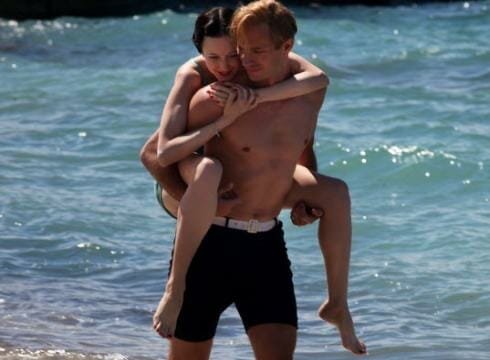
“You have no idea how hard it is to live out the greatest romance of the 20th Century.”
Last year’s thrilling drama A Dangerous Method (directed by David Cronenberg), sought to insert Sabina Spielrein into the history of psychoanalysis by telling the true story of her love affair with Carl Jung and her personal relationship with Sigmund Freud. Madonna’s W.E., Madonna’s feature directorial debut, has similar goals, attempting to reposition Wallis Simpson as a strong, enigmatic woman whose passion for one man changed the world. That’s as far as the comparison goes, though, for W.E. is less a complete film than a fun collection of the director’s musings—some credible—on the controversial affair and eventual marriage of King Edward VIII (James D’Arcy) to American divorcée Wallis Simpson (Andrea Riseborough). Juxtaposed against their story is the much less-interesting tale of Wally Winthrop, (Abbie Cornish), a modern-day woman named after Wallis Simpson, who fantasizes about the famous couple in an attempt to work through her own tumultuous love life.
Despite its visual achievements and (perhaps, because of) its erotic, seductive tone, W.E. is a difficult piece to connect with, especially in the early going. Initially, the film plays too much like a really fantastic music video. It is flashy and fast-paced, which makes for pleasurable viewing, though the viewer suspects such an approach will be difficult to sustain. In effect, W.E. serves up delicious red velvet cupcakes in the form of fluid, dancing shots of beautiful women in beautiful lingerie (naturally) before serving the main course—the story that supposedly rocked the world.
Early in the film, painfully obvious parallels are drawn between Wally of the present-day scenes (set in 1998) and Wallis Simpson of the 1930s. The opening scene shows alternating shots of both women—tragic and beautiful (and cliché) in their loneliness—sitting down to carefully prepared meals from which their husbands are absent. The message is a bit heavy-handed—the two women are aligned, and perhaps all women are beautiful and tragic and lovelorn. Fortunately, this is only the beginning of W.E., and the story unfolds into a more engaging film, rich in entertainment, imagery and historical drama.
W.E. does represent an attempt to vindicate and celebrate a woman previously disregarded as a temptress and even accused by the tabloids of being a Nazi. The scenes set in the Thirties are, therefore, the strongest of the film. Much of this can be attributed to Riseborough. As Wallis Simpson, a woman who is supremely confident, even in her darkest hour. Riseborough’s energy bursts through the screen. In the scenes where she and the Edward are clearly swaying closer to an affair (which we never really see consummated), she manages to appear wholly interested without any desperation or even extreme passion. When she plays alongside her doting second husband (David Harbour), she acts with a similar restraint, even as she is utterly engaging at every dinner party and royal event to which she is often invited by a friend, the King’s first lover.
With W.E., Madonna seeks to transport us back to a lovelier, more glamorous time. With the help of costume designer Arianne Phillips (a 2011 Oscar nominee), she does just that. The “historical footage” feel created in many of the 1930s scenes—one of the scandalized couples’ first public outings was shot in this style—goes a long way in creating the illusion. The images of the two lovers are vibrant and vivacious, even as they maintain that grainy texture. Unfortunately, some of this feels out of place amid the very contemporary aesthetic otherwise in play throughout W.E. The music, for example, is fantastic but not always period-appropriate. Still, the director’s overall treatment of distance and intimacy—as explored in the camera shots and the script—often play beautifully.
Sadly, much of this praise really only applies to the 1930s scenes. The 1998 story pales in comparison, both in terms of narrative and visuals. The bright colors of Riseborough’s wardrobe and makeup (along with her sheer liveliness) contrast starkly with Cornish’s all-black-everything attire and presence. Cornish speaks only in hushed tones and seductive whispers—whether in bed or in business—rendering her character completely unbelievable and far too much like a wannabe Material Girl. Indeed, as presented, Wally Winthrop is the lesser character, looking both metaphorically to her namesake for answers to her own problems. (Nonetheless, the performance could have been stronger had the character was made to be weaker.) Thankfully, Wally’s new love interest, Evgeni (Oscar Isaac), brings some much-needed humor to a piece that, otherwise, takes itself too seriously. With the introduction of his character, the contemporary scenes pick up a bit and by its end, W.E. at least registers as an actual film—if a flawed one—as opposed to a really good, really long Madonna video.
Director: Madonna
Writer: Madonna, Alek Keshishian
Starring: Abbie Cornish, James D’Arcy, Andrea Riseborough
Release Date: Feb. 3, 2012